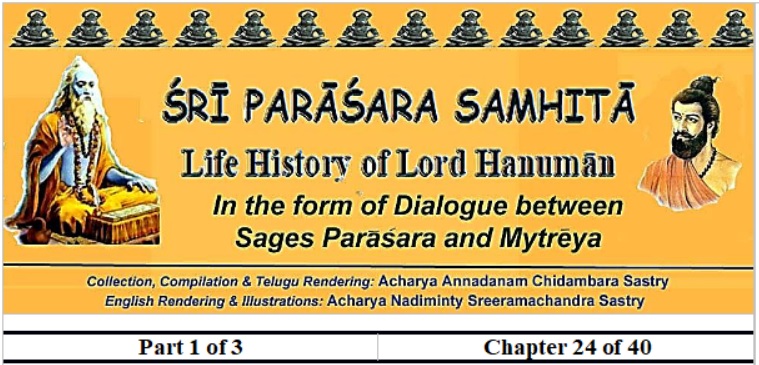
24th Chapter (Caturvimśatitamah Paţalah)
“Description of the Process of Routine Actions”
(Nityakarmavidhāna Kathanamm)
श्रीमैत्रेय: –
हनुमान्बलसंपन्नो ह्र्ंजनानंदवर्धन:
कस्मिन् देशे निवसति किमाचरति सर्वदा।। 1
Mytrēya:
“Oh! Sage Parāśara! At which place does Hanumān, the son of Ańjana, endowed with great powers live? What does he do all the time? (1)
कीदृशा: पार्षदास्तस्य किं कुर्वन्ति महात्मन:
किमाहारो विहारो वा कालक्षेप: कथं हरे:।। 2
What sort of individuals are around Him? How do they serve the great soul? What is the food of Hanumān? How does He move about? How does he spend His time? (2)
श्रोतुमिच्छाम्यहं ब्रह्मन् वक्तुमर्हसि सुव्रत!।। 3
I want to hear about these things. Oh! One dedicated to the discipline of rituals (vratanişţţha)! Please tell me”. (3)
श्रीपराशर:
साधु पृष्टं त्वया विद्वन्-हनूमच्चरितं शुभम्
श्रृणुष्वैकमना भूयो वक्ष्यामि मुनिपुंगव! ।। 4
Parāśara:
“Oh! Great scholar! Great sage! That was asked nicely by you. I am telling you the auspicious history of Lord Hanumān. Listen with attention. (4)
सुमेरो:नै तेर्भागे पर्वतो गंधमादन:
सर्वपादपसंकीर्णो विचित्रो धातुमंडित:।। 5
Gandhamādana mountain
On the Sourh-West direction of the great Mount Mēru (in Himalayas) is located the Gandhamādana mountain. Covered extensively by all varieties of trees, it shines because of the presence of several strange minerals. (5)
नानाशकुंतविरुतै: नानाकुसुमराशिभि:
सुवर्णकदलीषंडै: नीरंध्रफलराजिभि:।। 6
It is resplendent with sounds of various birds, groups of different flowers, gold tinged banana groves, and trees with several fruits. (6)
मुनीनां पर्णशालाश्च ब्रह्मयज्ञसुशोभना:
गंधर्वमिथुनानां च क्रीडाकुंजास्सहस्तश:।। 7
There are the hermitages of sages reciting Vēdas, couples of Gandharva clan, thousands of creeper-entwined sheds for playing (NOTE: An alternative text heere was ‘bahavstatra śōbhanā’ = many are the beautiful things there). (7)
एलालवंगकक्कोलचंदनागरुशाखिन:
कर्पूररंभाजंबीरमातुलुंगकदंबका:।। 8
(There are) plants/trees of cardamom, cloves, herbs, sandal and others, trees of Karpoora banana (a native variety) citrus, citron (very thick skinned; mādi phala) burflower (Neolamarckia cadamba; kadamba) and others, (8)
नारिकेलाम्रपनसजंबूखर्जूरदाडिमा:
द्राक्षाबदरनारंगसेमंतीचंपकादय:।। 9
Coconut, mango, jackfruit, black-apple (jamboophala or kālā jāmun), palm dates, pomegranate, grapes, jujebi, orange, flowers chrysanthemum, champaka (Magnolia champaca) and others. (9)
पुन्नगाशोकमालत्य:-वासंतीनवमल्लिका:
तालास्तमाला हिंताला:-वकुला: केतकादय:।। 10
Laurel tree (Ball tree; Nāga Campa or Punnāga), asōka (Saraca asoca), white jasmine (Jasminum polyanthum; vaasantee), forest jasmine (Hedysarum sennoides; navamallikaa), palmyra or tala palm (Borassus flabellifer), Malabar leaf (Cinnamomum tamala), marshy date (hintaala), pagoda flower (Clerodendrum paniculatum; valoola, also known as Kŗşhna or Hanuma kireetam = crown of Hanumān), kētaki (in Sanskrit.; Pandanus odoratissimus) and all other types are there. (10)
तत्रत्यसर्वसत्त्वानां-जातिवैरंन विद्यते
तरवस्सर्वकालेषु फलितास्तत्रपुष्पिता:।। 11
There was no enimity between species there.Green trees come into bloom and give fruit in all the seasons. (11)
पुष्पांबुकुल्या: सर्वत्र-कस्तूरीमृगिणस्तथा
बहुकुंकुमकेदारा:-सन्ति कर्पूरराशय:।। 12
Everywhere, there are streams of honey, flocks of kastūri (fragrant material) giving musk-deers, fields of saffron, heaps of camphor (karpooram). (12)
एवंविचित्रशैलेन्दे्र-कपींद्रो गंधमादने
मनोहरै: महाकुंजै:-मकरंदसरोवरै:।। 13
On such a stramge and unique Gandhamādana mountain, lives Lord Hanumān amidst great shrubs and bushes, lakes of flower-nectar, (13)
सर्वर्तुगुणसंपéन्ने-सर्वप्राणिसुखावहे
गिरिनिर्झरसाहस्त्रै: शतैश्च कमलाकरै:।। 14
(With) thousands of streams full of pure sweet water in all seasons that give comfort to all creatures, hundreds of lakes full of water flowers,(14)
सिंहव्याघ्रवराहैश्च-शरभैर्गवयैश्शशै:
मृगैरन्यैर्द्विजैरन्यै:-श्वापदैश्च समाकुले।। 15
Teeming with lions, tigers, wild pigs, camels, eight-legged big beasts (śarabha), hares and many other wild animals and bitrds. (15)
तत्र दिव्यगुहा रम्या-विशाला युक्तमारुता
दशयोजनविस्तीर्णा-सुवर्णमणिरंजिता।। 16
Abode of Hanumān
There is a (about) forty square kilometer (daśayōjana vistīrņa) wide cave that is beautiful, cool and with constant mjld breeze and shining with gold and precious stones. (16)
तस्यां हनूमत्प्रीत्यर्थं-निर्मिता विश्वकर्मणा
महेंद्रस्याज्ञया रत्न-शाला: सौवर्णशालिका:।। 17
In that, commanded by Indra, the celestial architect Viśvakarma built halls of gold and precious stones for use by Lord Hanumān.. (17)
काश्चिद्गारुडशालाश्च-काश्चिन्मौक्तिकशालिका:
इंद्रनीलमयाश्शाला:-प्रवालखचितांतरा:।। 18
Some of them are studded with emeralds, some with pearls, some with sapphires, some with red coral stones, (18)
पद्यरागमया:काश्चित्-कुरविंदैश्च भूषिता:
वैदूर्यमणिकुड्याश्च-शुद्धस्फटिकवेदिका:।। 19
Some with deep red rubies (ratnarājam, king of precious stones), some with corondums (kuruvinda), also some have walls studded with cat’s eye (vaidooryam) and some venues were made of pure quarz (sphatikam). (19)
शातकुंभमयस्तंभा:-दांतराजिततोरणा:
पुष्यरागमयद्वारा:-मणिकुट्टिमभूमय:।। 20
Golden pillars, door hangings (tōraņa) made of ivory, doorframes full of puşyarāgas (yellow sapphire), floors studded with diamonds, (20)
मुक्तवितानसाहस्त्रौ:-ग्रथिताश्च समंतत:
महासंस्करणोपेता:-वैजयंताधिकप्रभा।। 21
Borders lined with thousands of pearls and well decorated and having brightness higher than that in the ‘palace of victory’ (vaijayanta) of Indra, (21)
सुधर्मातुल्यसौभाग्या:-विचित्रपुष्पकोपमा:
सुवर्चलायुतोनित्यं-तासु क्रीडति मारुति:।। 22
हनुमान् प्रातरुत्थाय-स्मरन् रामं गुणोत्तमम्
पद्याक्षतुलसीमाला-चोध्र्वपुंड्र्ंच धारयन्।। 23
Hanumān’s Daily Routine
Waking up early in the morning Hanumān takes the name of the most virtuous Rāma. He wears lotuses, rudrākşa seeds (of trees Elaeocarpus ganitru;, Rudra = Śiva’s, akşa = eye), beades of tulasi (holy Basil) and putting a vertrically straight mark on his forehead, (22 – 23)
कृत्वा मैत्रादिसंस्कार-प्रतिष्ठं देवतालयम्
राघवं जानकीनाथं-भरतादिभिरूर्जितम्।। 24
Having performed ablations to the Sun, He worshipses the Lord of Jānaki, i.e., Śrīrāmacandra along with Bharata and others, grandly tablished in a temple, (24)
अघ्र्यपाद्यादिभिर्धूपै:-दीपैर्बलिभिरुत्तमै:
तुलसीपुष्पमालाभि:-गन्धकस्तूरिकादिभि:।। 25
With offerings of water for drinking (āghyam), water for washing feet (pādyam); best quality incense (dhoopam), lamp light (deepam), food offering (naivēdyam); garlands of tulasi (holy basil); sandalwood paste (gandha), musk (kastūri) and other fragrant substances, (25)
आराधयित्वा देवेशं-पार्षदैस्सह भक्तिमान्
नृत्तगीतादिभिर्वाद्यै:-प्रतूर्यैर्बहुभिस्तवै:।। 26
With great devotion, worships the lord of lords along with his followers by dancing, singing, playing percussion instruments, long pipes and singing many praising hymns. (26)
पुलकांचितसर्वांगो-बाष्पपर्याकुलेक्षण:
ध्यायन्मुहूर्तं निष्चेष्टो-परमानंदसंप्लुत:।। 27
With the whole body in trance, with half closed eyes full of tears of pleasure, meditating, stunned for a while, then in great bliss now. (27)
ततो भागवतान्धन्यान्अर्चयित्वा महामति:
रामोपभोगत्वग्गंध-वासालंकारभूषित:।। 28
Then that wise one worshipps the auspicious priests, and, adorned with pariviştita (offered to the deity) body sandal pasting, clothing, ornaments and others, (28)
तस्यैवोपनिषत्पुण्य-मीमांसाश्रवणोत्सुकान्
आनंदयितुमासीने-हनूमति वरासने।। 29
Prepared to enlighten those wishing to listen deliberation and discourses on life, Hanumān is seated on an appropriate seat. (29)
सेवार्थं कपिसिंहस्य-सायंप्रातस्समाहिता:
गंधर्वाप्सरसो देवा:-सिद्धास्साध्याश्च चारणा:।। 30
Groups gandharvas (singing celestials), apsaras (dancing beuties of heaven), devas (celestial personalities), siddhas (achievers), sādhyas (accomplishers), caraņas (bards), (30)
विद्याधराश्च यक्षाश्च-नागाश्च सहकिन्नरा:
समागम्य प्रयत्नेन-मुनय: परमर्षय:।। 31
Vidyādharas (a class of supernatural beings), yakşas (gaurdians of treasures), nāgas (serpant gods); kinnaras (half man half animal beings); and ascetic thinkers and seers that gathered on purpose, (31)
आराधयंत: सततं-गानोपायनपाणय:
गंधपुष्पाक्षतैश्चैव-बलिभिर्घूपदीपकै:।। 32
Carryingin in their hands necessary special items and gifts as they are desirous of worshipping with sandalwood paste, flowers, sacred rice (akşatas), incence, lamps, food offerings, (32)
दिव्यांबरैर्भूषणैश्च-फलैरमृतसन्निभै:
नृत्यंतश्चा पि गायंत:-स्तुवंत: पुष्कलैस्स्तवै:
एवं संभावयंतस्ते-गच्छन्त्येव यथागतम्।। 33
Gods Worship Hanumān
Offering grand clothings, ornaments, fruits sweet as heavenly nectar (amŗta); dancing, singing adequate praising hymns, they were worshipping Hanumān (as follows) and returning the way they came. (33)
श्रीवरमखिलवेदस्वरूपममितप्रतापं अंजनागर्भसंभूतं,
अखिलभुवनप्रख्यातं, केसरिप्रियनन्दनं, कौंडिन्यवंशोद्भवं,
कवलीकृतबालभानुं, गंधवहसूनुं, सुग्रीवसचिवं,
अमितप्रभावं, रामकार्यधुरंधरं, राक्षससंहारं,
सागरलंघनजंघालं, सामगानलोलं, दशग्रीवहरं,
दारिताक्षप्रमुखासुरनिकरं, सीताशोकविनाशिनं,
श्रीरामप्रीतिवर्धनं, मकरीशापमोचनं मर्दितकालनेमिं,
मैरावणमर्दनं सौमित्रिप्राणदातारं,
सकललोकाधारं, श्रीसीतारामयो:, परमसन्तोषयोगकरणं,
श्रितभक्तमन्दारं, भविष्यद्ब्रह्मरूपं, भगवत्स्वरूपं,
घनवालरोमनिर्मितशिवलिंग, करुणातरंग,
उदयास्ताचलार्चितपादयुगलं, सुरमुनिविनुतसुचरितं,
श्रीसुवर्चलाकलत्रं, भक्तप्रतिज्ञानिर्वहणचातुर्यं,
भुक्तिमुक्तिदायकं, पुरुषवरेण्यं, आदिपुरुषं, अतिविजयं,
श्रीमतं हनुमन्तमुपास्महे।। 34
-
सर्वदॆवता स्तुतिः
Sarvadēvatā stutih = Eulogy of
Hanumān by all Gods
NOTE: ‘m’ at the end of each epithet indicates the accusative case in Sanskrit
श्रीवरम् Śrīvaram
Auspecious Sir
अखिलवॆदस्वरूपम् Akhilavēdaswarūpam
Very form of all Vĕadas
…….. so on Amitapratāpam
Of unlimited valour Ańjanāgarbha sambhootam
Born to Ańjana
Akhila bhuvana prakhyātam Famous in the whole universe Kĕśari priyanandnam Dear son of Kĕśari Koundinya vamśōdhbavam Born in Koundinya clan Kabalīkŗta bālabhānum Child Sun grabber Gandhavaha soonum Son of Wind God Sugrīva sacivam Minister of Sugrīva Amita prabhāvam With unlimited impact Rāmakārya dhurandharam Expert in performing Rāma‘s tasks Rākşasa samhāram Destroyer of demons Sāgara langhana janghālam Fast jump-crosser of the sea Sāmagāna lōlam Immersed in singing as per Sāmavĕda Daśagrīva darpaharam Destroyer of Rāvaņa’s pride Dāritākş pra mukhāśuranikaram Destroyer of main demons like Dāritākşa Sītāsōka vināśakam Remover of Sŗīās‘s grief Śrīrāma prīti vardhanam Increaser of Śrŗrāma’s dearness Makarī śāpavimōcanam Remover of the curse on demon named Makarī Mardita Kālanĕmim Destroyer of demon Kālanĕmi Mairāvaņa mardanam Beater of demon Mairāvaņa Soumitri prāņadātāram Saver of Lakşmaņa’s life Sakala lōkādhāram Basis of all the worlds Śrī Sitārāmayōh parama santōşayōga kāraņam Cause of eternal happyness of auspicious Rāma and Sīā Śritabhakta mandaram Delight to the ardent devotees Bhavişyadbrahma rūpam The form of the future Creator – Brahma Bhagavatswarūpam The form of the Almighty Ghana vālarōma nirmita Śivalingam Builder of Śiva’s Linga with thick tail hairs Karuņāntarangam Kind-hearted Udayāstācala pādayugaįam One with both feet on Sunrise (Eastern) and Sunset (western) mountains Suramuni vinuta sucaritam With auspicious history praised by gods and sages Srisuvarcchala kaįatram The one with Srisuvarcchala as wife Bhaktapratigńyā nirvahaņa cāturyam Adept at fulfilling vows of devotees Bhuktimukti dāyakam Bestower of food adequacy as well as liberation Puruşvarĕņyam Best among men Ādipuruşam The very first man Ati vijayam Most victorious Śrįmantam Rich (in all) one Hanumanta mupasmahĕ (Such) Hanumān, we worship
NOTE: All the gods worshipped Hanumān in the above manner.
Gloriousness of Hanumān
Then (while worshipping), seeing the most surprisingly beautiful countenance-nature (of Hanumān), even the gods, for a time, got romantically captivated and remained astounded. (34)
इत्याश्चर्यकरं तस्य-सुन्दरत्वं सुरादय:
दृष्ट्वा भवन्ति निश्चेष्टा:काले मदनमोहिता:।। 35
Seeing Him as if the whole radiant power of all the worlds was heaped at one place, Jayanta (Indra’s son) and Manmatha (Cupid), who themselves are very beautiful, cursed themselves, (35)
लावण्यं सर्वलोकस्य-राशीभूतमिव स्थितम्
दृष्ट्वां मानं विनिंदंति-जयंतमदनादय:।। 36
The son of Wind God Hanumān, very strong, smelling piously, pure, orange colour complexioned, tall body, with big mouth, leader of the monkey warriors, (36)
वायो:कुमारो बलवान्-पुण्यगंधमयश्शुचि:
नारण्यवर्णो दीर्घांग:-पृथुवक्त्र: कपीश्वर:।। 37
Having (brilliant) face with eyes resembling lotuses that bloomed in the lake of the heavenly nectar (amŗita), He takes such grand forms as per need of the time.(37)
रूपं धारयते दिव्यं-तत्तत्काले यथोचितम्
वदनामृतकासार-संभूतनयनांबुज:।। 38
Having tail resembling the majestic flow of River Ganga, seated on a diamond srudded golden theone like Mount Mĕru with all auspicious features, (38)
गंगाप्रवाहविलसल्लांगूलकृतमेरुवत्
विलक्षणतमेवा·स्मिन्-रत्नसिंहासने स्थित:।। 39
That one, who excuses all sins, noble, courageous, powerful, valorous; making commentary on Brahmasamhita (a scripture on Brahma) is fulfilling every wish of seekers, (39)
ददाति सकलान्कामान्-चाख्यायन्ब्रह्मसंहिताम्
अपचारक्षमी वीर्यशौर्यतेज:पराक्रम:।। 40
The brightness of diamonds like that of the Sun and the pleasant moonlight of the Moon are naturally present in Hanumān, He being the very soul of the Trinity of Gods.(40)
अतितेज:प्रभा सूर्ये-यथा चंदे्रे पि चंद्रिका
मूर्तित्रयात्मके तस्मिन्-नित्यं सन्ति स्वभावत: 41
Dwellers of the Earth (Bhūlōka), the abode of the Sun and the planets and is also inhabited by semi-divine beings who may occasionally take a part in human world as well (Bhūvarlōka), the abode deities like Indra and various sages and gandharvas (Swargalōka), the abode of great sages and seers that are beings who, through long periods of sacrifices have become greater than the gods themselves. (Maharlōka), the abode of realised souls of complete and unhindered access to the material world (Janalōka), the world of pious sacrifices immortal beings, who are personification of knowldge. (Tapolōka) and the abode of Lord Brahma, the Supreme Consciousness (Satyalōka), on hearing His history, (41)
श्रुत्वादृष्ट्वा चरित्राणि भूर्भुवस्स्वर्गवासिन:
महर्जनतपस्सत्यलोकस्था अपि नित्यश:।। 42
Always are greatly surprised and praise that great personality. Hanumān, on completion of the noon rituals, (42)
अद्भुतं परमं गत्वा संस्तुवन्ति महात्मन:
ततो मध्याह्नसमये निर्वत्र्यावश्यकक्रिया:।। 43
Again gets immersed in worshipping Lord Śrīrāmacandra. After eating the left over fruits and rice offered to Lord Śrīrāma, (43)
पूर्ववद्रामचद्रस्य समाराधनमीहते
तच्छेषफलमूलान्नमास्वाद्य स महामति:।। 44
He reads out the Ramayaņa story written by sage Vālmīki, that is dear to Śrīrāma, till the evening. (44)
रामायणकथां दिव्यां पुरा वाल्मीकिना कृताम्
आसायमनुसंधत्ते रामसंतोषकारणात्।। 45
Completing all the evening rituals, He worships Śrīrāma and remaining in meditation of Śrīrāma mantra, (45)
कृत्वा सायंतनं कर्म पूर्ववज्जानकीपतिम्
अभ्यच्र्य राममंत्रार्थ तत्परो ध्यानसंभृत:।। 46
Enjoys Yoganidra (full relaxation in Yōga) and gets the satisfaction of sleep. Once in a while, riding his mighty camel that goes as fast as mind, (46)
योगनिद्रामनुभवन् सुखशय्यां भजत्यसौ
कदाचिदुष्ट्रमारुह्ना मनोवेगं महाबलम्।। 47
Tours all the worlds and gives bliss to the gods and demigods. Seeing such a wonderful power of Lord Hanumān, (47)
पर्यटन्सकलान्लेाकान् संतोषयति देवता:
एवं दृष्ट्वा हनुमतो महिमानं महाद्भुतम्।। 48
Gods Establish Hanumān Idols
Greatly surprised Indra and other directional lords (dikpālaka) established grand auspicious idols of Lord Hanumān, in the eight directions. (48)
इंद्रादयो लोकपाला: विस्मयं परमंगता:
हनुमद्विग्रहानष्ट दिक्षु संस्थाप्य भक्तित:।। 49
And entrusted the same to the devout aides of Lord Hanumān. On the bank of a lake located away from the cave of the Gamdhāmadana mountain in the East (49)
तत्पार्षदेभ्य: प्रददु: अष्टौ ते गंधमादने
गुहाया:पूर्वदिग्भागे दूरतस्सरसीतटे।। 50
Indra established an idol Lord Hanumān and entrusted it to Jāmbavanta. Auspicious establishment of Hanumān in the South-East (agnĕya) was done by Agni (Lord of Fire) (50)
हनुमंतं प्रतिष्ठाप्य शक्रोजांबवते ददौ
आग्नेये पावक: श्रीमान् आंजनेयनिधिं शुभाम्।। 51
With appropriate devotion and entrusted it to Vinata. Similarly, in the South, devout Yama (Lord of Death/Virtue) (51)
संस्थाप्य विधिवद्भक्त्या विनताय ददौ प्रभु:
तथैव दक्षिणे भागे धर्मराजं स भक्तिमान्।। 52
Established auspicious Hanumān idol and entrusted it to Nįla. Then in the Sout-West (Naiŗti) (52)
नीलाय प्रददौ देवो हनुमत्प्रतिमां शुभाम्
र्नै ते प्यथ दिग्भागे फलादानमधीश्वर: 53
Nirŗti, its ruler established the boon-giving Hanumān idol and, lovingly touching it, entrusted to Panasa. The rian-water lord (Varuņa), having established the Hanumān idol in the West, (53)
पनसाय ददौ प्रीत्या हनुमन्मूर्तिमस्पृशन्
वरुण:पश्चिमे भागे व्यावाह्म हनुमत्तमम्।। 54
Worshipped and entrusted it to Gandhamādana. Auspicious Hanumān idol was established, in the North-West (Vāyuvya), by the Lord of Wind Vāyu, (54)
गंधमादनपूजार्थ समाराध्य ददौ सुधी:
वायुर्वै वायुदैवत्ये हनूमद्विग्रहं शुभम्।। 55
And, to satisfy Hanumān, entrusted it to Suşēna. In the North, Kubēra the lord of Yakşas and Gandharvas (55)
आंजनेयप्रियार्थं वै सुषेणायार्पयत्सुधी:
कुबेरस्सोमदिग्भागे-यक्षगंधर्वनायक:।। 56
Entrusted to Mainda, the Hanumān idol. In the North-East (Ēśanya), bestower of auspiciousness to all the worlds, husband of Pārvati, Lord Śankara himself (56)
हनूमत: प्रतिकृतं मैंदाय प्रतिपादयत्
ईशान्य: पार्वतीनाथ: शंकरो लोकशंकर:।। 57
Entrusted the Hanumān idol to Dvivida. (57)
हनूमदुपमां देवो द्विविदाय प्रदत्तवान्।। 58
Vāasāgara
Because Hanumān collected, or rather dammed the waters flowing down from the ritual pourings-on (abhişekha) with the end part of his tail, that river came to be known as Vāasāgara (tail sea), (58)
देवै:कृताभिषेकोत्थ तीर्थेन हनुमत्प्रभो:
वालाग्रात्प्रच्यते तेन नद्यास्ते वालसागरा:।। 59
There exist thousands of majestic swans, golden lotuses, groups of golden bees and ruddy geese (cakravākas).(59)
राजहंससहस्राणि सुवर्ण कमलानि च
स्वर्णभ्रमरवृन्दानि चक्रवाकानि तत्र वै।। 60
Couples of gandhrava apsara (demi-gods) ladies played with flowers and fruits in the shrubs of willow reeds (vētasa; Homonoia riparia) located there. (60)
हैमवेतसकुंजेषु गंधर्वाप्सरसांगना:
क्रीडंति मिथुनीभूया: तत्र पुष्पफलेषु च।। 61
Sages, gods and demi-gods, men and all others take bath in that river (Vāasāgara). They turn pure and calm and obtain the four fruits of life (puruşārdtha), namely, dharma (virtue), artha (wealth), kāma (wish) and mōkşa (liberation). (61)
तस्यां सर्वे निमज्जंते मुनयो देवमानुषा:
चतुर्विधान्पौरुषार्थान् प्राप्नुवंति सुनिर्मला:।। 62
Because of worshipping that Supreme Being Rāma in such a manner and always involving himself in it, the great soul Hanumān is waiting ready to become Brahma, the Creator in future. (62)
एवंमहात्मा पवनात्मजो हरि:
रामाभिधानस्य परस्य पुंस:
नित्यंसमाराधनतत्परो बली
प्रतीक्षते ब्रह्मपदं भविष्यति।63
Having four shoulders, sitting on a diamond studded throne and shining like Brahma, he was making the devotees recite the rescuing name of Rāma. (63)
चतुर्भुजो भक्तजनावलीभ्य:
सिंहासने रत्नमये निषण्ण:
अध्यापयन् तारकमंत्रराजं
विराजिते सौ कमलासनो यथा। 64
There is no one in the three worlds, including four-faced Brahma, five-faced Brahma, Kumāraswāmy (son of Śiva) 1000-hooded Śēşa (great first serpent), that understands great soul Hanumān”. (64)
चतुर्मुख: पंचमुखश्च षण्मुख
स्सहस्त्रजिह्नादय सम्मुखो वा
त्रिमूर्तितेजोमयमईजनेयं
ज्ञातुं समर्थो स्ति नहि त्रिलोक्याम्।। 65
Saptākşarį Mantravidhānam
(Procedure of Seven-lettered mantra)
‘Then I am explaining the 7-lettered mantra of Hanumān that gives men the four fruits of life (puruşārdtha). (65)
: अथ सप्ताक्षरीमंत्रविधानम् :
अथ मंत्रं प्रवक्ष्यामि सप्तवर्णहनूमत:
यो ददाति नृणां लोके पुरुषार्थांश्चतुर्विधान्।। 66
After uttering the saving letter ‘Śrī’ (= revered), ’Hanumatē namh’ is said.(= salutions to Hanumān). The ‘body touching’ (ańganyāsa) and hand gesticulations (karanyāsa) have to be performed. (66)
उच्चार्य तारंश्रीवर्णं ततो हनुमते नम:
अंगन्यासकरन्यासौ मूलमंत्रेण संस्पृशेत् 67
After imbibing (from Guru) this saptākşarį mantra of Hanumān, one has to recite it 300,000 times. One-third of it has to be with ‘water offering’ (tarpaņa), one-tenth of it has to be ‘fire sacrifice’ (hōma) and one-tenth has to be food offering (annapradāana). (67)
इदं सप्ताक्षरं लब्ध्वा गुरोर्लक्षत्रयं जपेत्
तत्त्द्दशांशत: कुर्यात् तर्पणं होमभोजने।। 68
It is said that for this mantra – the sage (ŗşi) is Śaunaka, metre (chandas) is Gāyatrī, God is Hanumān and the seed (beej) is Mārutātmaja (Son of Wind God), (68)
ऋषिश्शौनक एवात्र गायत्रीछंदएव च
हनुमान्देवताबीजं मारुतात्मज एव च।। 69
The power (śakti) is Ańjanāsūna (Son of Ańjana), key (kīla, spark) id Vāyuputra (Son of Wind God). The protective circle (digbandha) has to be told with Gāyatrī and then perform meditation. (69)
शक्तिरत्रांजनासूनु: वायुपुत्रस्तु कीलकम्
दिग्बंधनंतु गाय या कृत्वा ध्यानं समाचरेत्।। 70
One has to always think of and meditate upon Lord Hanumān, the redeemer of wishes, of calm personality, highly capable and incomparable (nirupamāna). (70)
चिंतितार्थप्रदंदैवं शांताकारं महाप्रभुम्
संततंचिंतयेच्चित्ते हनूमंतमनूपमम्।। 71
Bear and monkey clans always follow this mantra. Jāmbavanta, Vinata, Nīla, Panasa, Gandhamādana, Suşēņa, Mainda and Dvivida are the main warriors following this. (71)
ऋक्षवानरगापेच्छमिंमंमंत्रमपुपासते
जांबवान् विनतो नील: पनसो गंधमादन:
सुषेणमैंदद्विविदा: प्रधानास्तत्र वानरा: 72
There are more and more warriors, great souls and mighty strong ones. Accompanied by millions of strong follower groups, (72)
अन्ये च बहवश्शूरा: महात्मानो महाबला:
परिवारैस्त्रयंस्त्रिशत्कोट्यर्बुदगणैर्वृत:।। 73
Goes around the fearless Hanumān. It is said that there are five types of bows (salution) in prostrated position (sāştāńga namaskāra) for Him. (73)
अकुतोभयसंचारो एवं स रमते हरि:
नमस्काराश्च साष्टांगा: पंचसंख्या: प्रकीर्तिता:।। 74
Power of Hanumān Worship
Similarly, five types of circumambulation (pradakşiņa) are described for Him. (74)
प्रदक्षिणविधिस्तद्वत्कथित: श्रीहनूमत:।। 75
Those that bow to Nīla first and then to Hanumān will become auspicious and pure in the world. (75)
आदौ नीलं नमस्कृत्य पश्चाछीहनुमत्प्रभूम्
य: करोति नमस्कारं स धन्यो लोकपावन:।। 76
Oh! Sage Mytrēya! Only after worshipping Nīla, who is on the left side, Hanumān has to be worshipped with devotion. (76)
हनुमद्दक्षिणे भागे स्थितो नीलस्सुसेवित:
पश्चात्सेव्य: समं भक्त्या हनूमान्मुनिसत्तम।। 77
On the 10th day of the waxing moon fortnight (śuddhapakşa) of the month of Jyēşttha (3rd Indian lunar month), Sun god married his daughter Suvarcchala with the great soul Hanumān. (77)
ज्येष्ठशुद्धदशम्यांचपद्मबधुस्सुवर्चलाम्
हनूमते ददौ बालां स्वतनूजां महात्मने।। 78
I bow with reverence to the one born to Ańjana – Hanumān, who is surrounded bymany monkey warriors and the actual form of all gods (sarvadēvātmaka). (78)
अंजनागर्भ संभूतं बहुवानरसंयुतम्
सर्वदेवमयं देवं हनूमंतं नमाम्यहम्।। 79
Whoever worships Hanumān systematically on the 10th day of the waxing moon fortnight (śuddhapakşa) of the month of Jyēşttha, will get all his wishes fulfilled. (79)
ज्येष्ठशुद्धदशम्यां च भक्त्या पूजां करोति य:
उपचारै: हनुमत: स भवेत्समनोरथ:।। 80
While sowing seeds or incorporating ‘seed letters (beejakşara) in a mantra, during wedding, travel, experiment-deed (prayōga), while visiting the king, when in trouble due to a lion or crocodile or tiger or snake, while sleeping, (80)
बीजावापे विवाहे च प्रयाणे प्रभुदर्शने
र्सिहादिमकरव्याघ्रसर्पदोषादिसंकटे।। 81
In times of emergencv, in the forest, on wearing new ornaments, while crossing rivers or sea, when the central pillar of the house (old type) collapses, during great fear or freight of getting trapped in house (gŗhanirbhandha), (81)
आपत्काले·रण्ये च नव्याभरणधारणे
नदीसमुद्रतरणे गृहस्तंभे महाभये।। 82
While entering a (new) house, during war, education, copulation, hunger, gambling, enjoyment, yawning, performing auspicious rituals, (82)
गृहप्रवेशे युद्धे च विद्याभ्यासे च संगमे
क्षुते द्यूते विनोदे च जृम्भणे शुभकर्मसु।। 83
While wearing new clothes, taking medicine or eating, while in fear of seing bad things or in danger of unknown trouble, while mounting horse or elephant, (83)
धारणे नव्यवस्त्रााणां औषधे भोजने तथा
दुर्दर्शनमहोत्पाते गजाश्वारोहणे तथा।। 84
When facing spirits, ghosts or demons, when struck by pox disease or big ailment, high fever or chills, (84)
भूतप्रेतपिशाचादि संकटे स्फोटके तथा
दुस्स्वप्ने पि महाव्याधौ तापशीतज्वरे पि च
पवित्रं हनुमन्नाम द्वादशावृत्तिमात्रत:
ये स्मरंति जनास्तेषां कार्यसिद्धिर्भवेद्ध्रुवम्।। 85
हरि: ओं तत्सत्
Whoever takes the name of Hanumān 1200 times will definitely succeed, i.e., will overcome the difficulty. (85)
इति श्रीपराशरसंहितायां श्रीपराशरमैत्रेयसंवादे नित्यकर्मविधानकथनं नाम चतुर्विंशतितम: पटल:
Thus ends the 24th Chapter, entitled “Description of the Process of Routine Actions” (Nityakarmavidhāna kathanamm) of Śrī Parāśara Samhitā
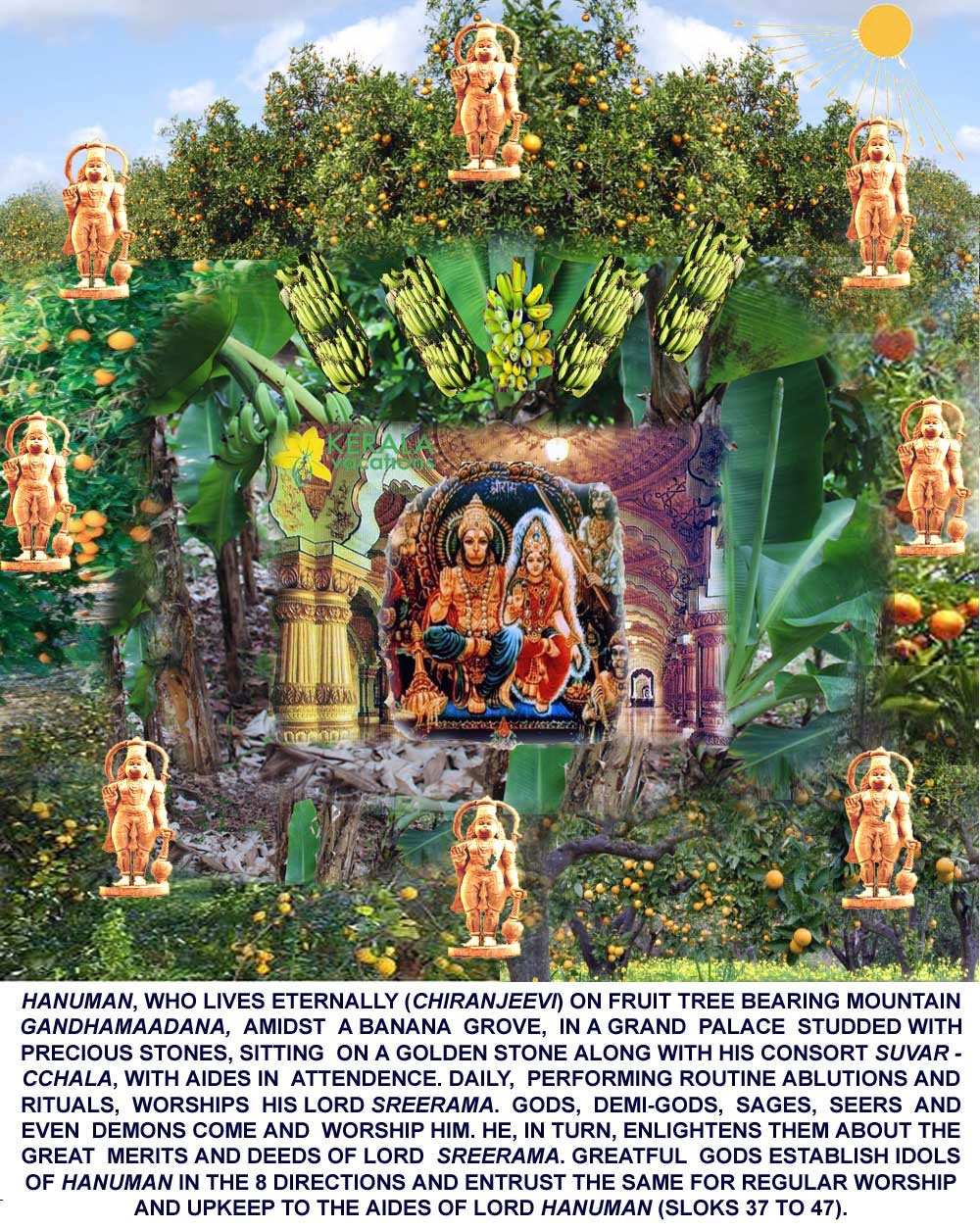
![]()

Click here to visit the Contents of the Part 1.
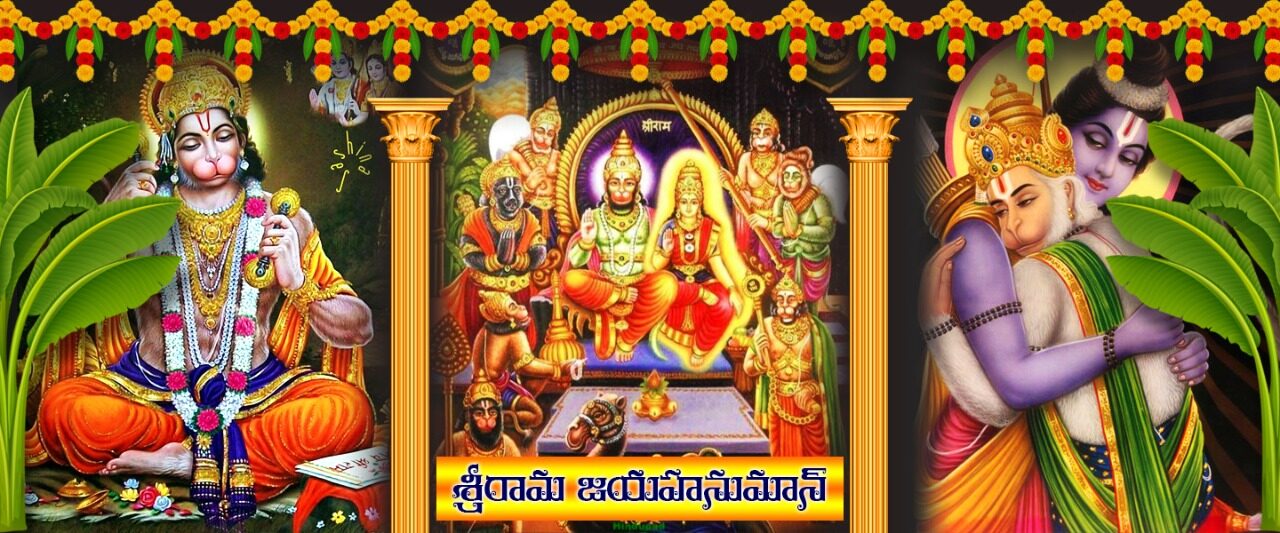

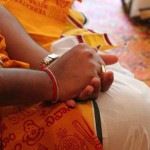


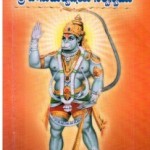
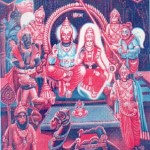
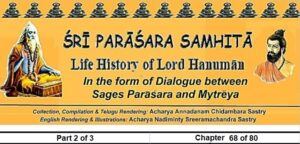
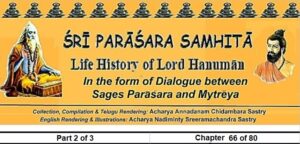
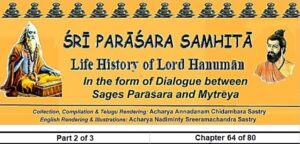
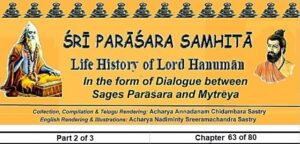
Be First to Comment